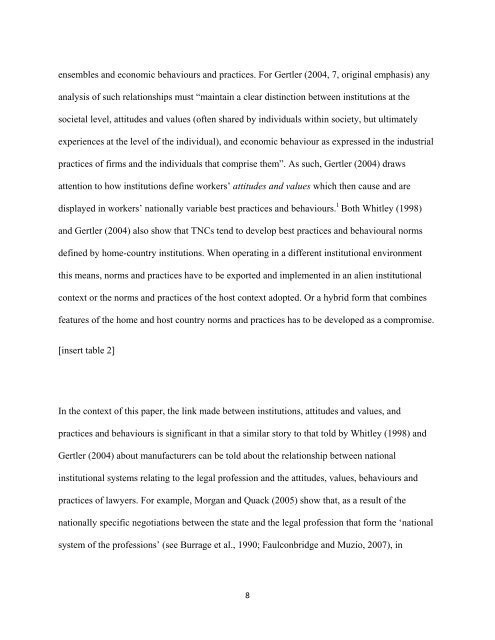Learning to be a lawyer in transnational law firms: communities of ...
Learning to be a lawyer in transnational law firms: communities of ...
Learning to be a lawyer in transnational law firms: communities of ...
Create successful ePaper yourself
Turn your PDF publications into a flip-book with our unique Google optimized e-Paper software.
ensembles and economic <strong>be</strong>haviours and practices. For Gertler (2004, 7, orig<strong>in</strong>al emphasis) any<br />
analysis <strong>of</strong> such relationships must “ma<strong>in</strong>ta<strong>in</strong> a clear dist<strong>in</strong>ction <strong>be</strong>tween <strong>in</strong>stitutions at the<br />
societal level, attitudes and values (<strong>of</strong>ten shared by <strong>in</strong>dividuals with<strong>in</strong> society, but ultimately<br />
experiences at the level <strong>of</strong> the <strong>in</strong>dividual), and economic <strong>be</strong>haviour as expressed <strong>in</strong> the <strong>in</strong>dustrial<br />
practices <strong>of</strong> <strong>firms</strong> and the <strong>in</strong>dividuals that comprise them”. As such, Gertler (2004) draws<br />
attention <strong>to</strong> how <strong>in</strong>stitutions def<strong>in</strong>e workers’ attitudes and values which then cause and are<br />
displayed <strong>in</strong> workers’ nationally variable <strong>be</strong>st practices and <strong>be</strong>haviours. 1 Both Whitley (1998)<br />
and Gertler (2004) also show that TNCs tend <strong>to</strong> develop <strong>be</strong>st practices and <strong>be</strong>havioural norms<br />
def<strong>in</strong>ed by home-country <strong>in</strong>stitutions. When operat<strong>in</strong>g <strong>in</strong> a different <strong>in</strong>stitutional environment<br />
this means, norms and practices have <strong>to</strong> <strong>be</strong> exported and implemented <strong>in</strong> an alien <strong>in</strong>stitutional<br />
context or the norms and practices <strong>of</strong> the host context adopted. Or a hybrid form that comb<strong>in</strong>es<br />
features <strong>of</strong> the home and host country norms and practices has <strong>to</strong> <strong>be</strong> developed as a compromise.<br />
[<strong>in</strong>sert table 2]<br />
In the context <strong>of</strong> this paper, the l<strong>in</strong>k made <strong>be</strong>tween <strong>in</strong>stitutions, attitudes and values, and<br />
practices and <strong>be</strong>haviours is significant <strong>in</strong> that a similar s<strong>to</strong>ry <strong>to</strong> that <strong>to</strong>ld by Whitley (1998) and<br />
Gertler (2004) about manufacturers can <strong>be</strong> <strong>to</strong>ld about the relationship <strong>be</strong>tween national<br />
<strong>in</strong>stitutional systems relat<strong>in</strong>g <strong>to</strong> the legal pr<strong>of</strong>ession and the attitudes, values, <strong>be</strong>haviours and<br />
practices <strong>of</strong> <strong><strong>law</strong>yer</strong>s. For example, Morgan and Quack (2005) show that, as a result <strong>of</strong> the<br />
nationally specific negotiations <strong>be</strong>tween the state and the legal pr<strong>of</strong>ession that form the ‘national<br />
system <strong>of</strong> the pr<strong>of</strong>essions’ (see Burrage et al., 1990; Faulconbridge and Muzio, 2007), <strong>in</strong><br />
8
















